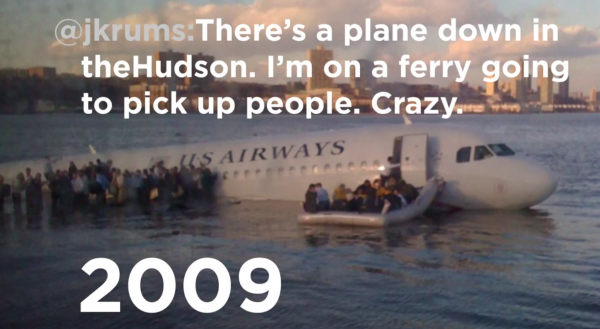Happy Birthday! Twitter turns 7

I've been on Twitter so long, I forgot just how short a time that really is -- or how much has changed since March 21, 2006. The service claims 200 million active users tweeting 400 million times a day. But the real measure is much larger -- how Twitter, and other innovations arriving around the same time, fundamentally changed billions of lives five to seven years later.
The service's editorial director, Karen Wickre, calls Twitter a "global town square", which is appropriate description. People gather to look, listen, gossip, grab news or listen to the town crier. I've often grumbled about the 140-character limitation, but brevity has benefits. Statements are succinct. No one talks on and on and on without interruption. If anything, butting in defines Twitter interaction. You will be heard whether or not anyone wants you to be.
"The percentage of internet users who are on Twitter has doubled since November 2010, currently standing at 16 percent", according to Pew Internet. Eighteen to 29 year-olds (27 percent), African Americans (26 percent) and urbanites (20 percent) are most-likely to use the social network. This pales in comparison to Facebook -- 67 percent of U.S. Internet users and 86 percent of 18-29 year-olds.
Twitter's start marks a golden age of innovation that transforms the lives of a large chunk of the earth's population. Facebook and Twitter opened to the public the same year -- 2006. YouTube did the same at the end of November 2005, but Google's acquisition 11 months later took the service everywhere. Then in June 2007, Apple released iPhone, which forever changed mobile devices. All the while, Google pushed forward development of Android and Chrome, which came to market in late 2008. Eveything today is different because of these products -- and others surrounding them.
I remember how hard watching video online was before YouTube. Now every major TV network streams programs, while services like Amazon, Hulu and Netflix develop compelling, original programs for streaming not traditional broadcast. YouTube is the global pulse of original video content, with the service now claiming 1 billion unique visitors a month. Facebook's 1 billion number is more -- unique users. While Twitter's reach isn't as wide, its impact, particularly as a tool used with the others, cannot be overstated.
The first real sense of what these tools could mean for connecting people, getting out information and even how it's reported the world over came in summer 2009 on the streets of Tehran. The best reporting on the Iranian protests wasn't from CNN or many news organizations but Flickr, Twitpic, Twitter and YouTube. Tweets, images and videos poured out in real time. Where did CNN get some of its best material? Citizen journalists, like this story and images from CNN’s citizen-driven iReport.
The process repeated during the Arab Spring -- protests erupting across the Middle East during early 2011 -- and to many events since. Where once white men in suits controlled editorial content appearing on TV or in newspapers, these tools empower you. Twitter often is where major news breaks first. Much of this reporting comes via mobile devices. Where once TV stations sent out film crews, you can capture the moment by photos, videos or Tweets sent from your phone. Name a major event since 2009 for which Twitter played no part? There are none.
Something else: Twitter, along with Facebook, YouTube and other social sharing services, are valuable forensic tools -- for historians, journalists or law enforcement trying to reconstruct events. Imagine if these tools existed on Sept. 11, 2001. What if people trapped above the raging fires where the planes impacted the Twin Towers could have posted last-minute photos (via service like TwitPic) or videos (to YouTube) or messages to friends and family (Tweets and Facebook Wall). Forensic investigators could have used the videos to better reconstruct what happened to the towers and when, as they sought to understand what brought the towers down and what changes should be applied to future buildings.
Except for YouTube, none of these tools were available to the masses before March 21, 2006. Happy birthday, Twitter. We can't remember life without you.